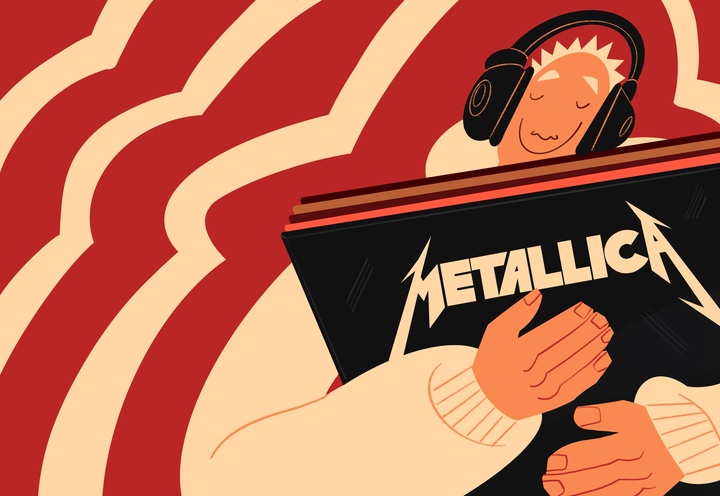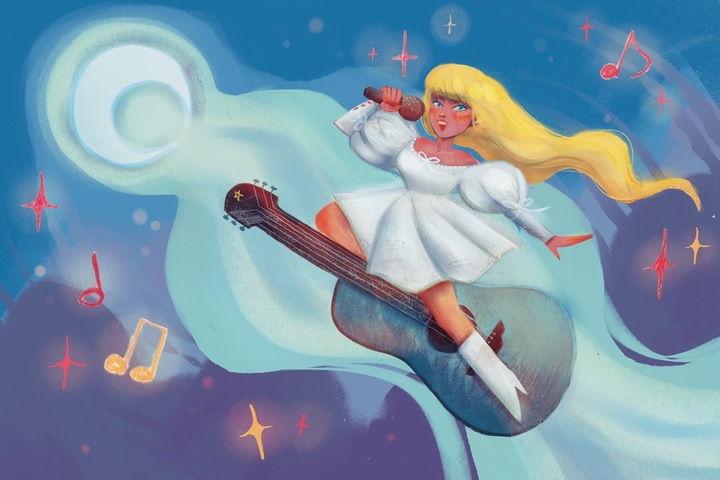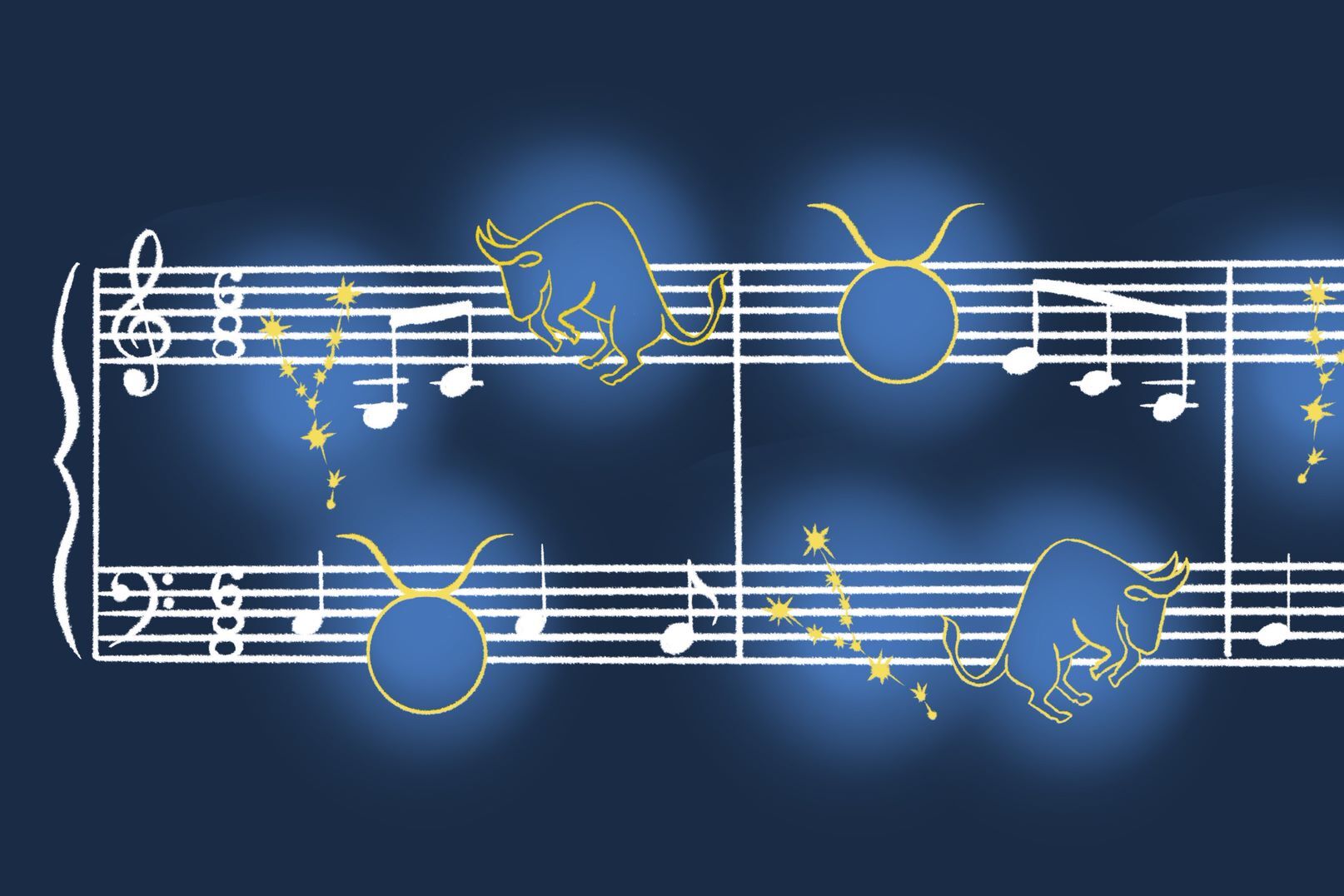One of the first things you notice about Car Seat Headrest’s Twin Fantasy is the striking album art. At first glance, it appears that these two anthropomorphic dogs are locked in a tender embrace, but upon closer inspection, it’s clear they are one and the same. The nose of one has become the eye of another. Their arms are linked like a Mobius strip, their limbs extending and looping, forcing them together in an unbreakable embrace. Whether you deem this melding of bodies as romantic or creepy will likely determine how you digest this album on your first listening.
Fortunately, one of Twin Fantasy’s many brilliant qualities is that it indulges and hints towards both readings, as it’s an album about both the joy and heartbreak of aligning yourself too closely with another person.
The album’s subject matter oscillates between the life-affirming and soul-shattering moments of a relationship, as singer-songwriter Will Toledo jumps back and forth in time to give us the full picture of its formation and subsequent destruction. The number of layers in this thing is truly astonishing, as the album pulls you in further and further with each listen. First off, there’s the title: Twin Fantasy. This clearly alludes to the act of being in a relationship – but also the unlikeliness of relationships between young people ending in anything other than heartbreak – in other words, a fantasy. It also pokes holes in what people look for in relationships – some look for a friend, while others consciously or subconsciously look for a reflection of themselves – their twin.
Then there’s the tracklist, with all of its diametrically opposed couplets (the first track, “My Boy (Twin Fantasy)” is reflected by the last track “Twin Fantasy (Those Boys),” as are “Sober to Death” and “High and Death”). In “Stop Smoking,” the narrator implores his boyfriend, “Stop smoking, I love you.” By the time “High to Death” rolls around, the narrator is so hopelessly broken he tells him to “Keep smoking, I love you.” This combination of genuine sweetness and self-destruction is what makes this album such an unnerving, intoxicating and emotionally cathartic listen.
Plenty of artists have tried their hand at adapting adolescent confusion into a song, but few have ever done it quite as successfully as Toledo does on Twin Fantasy. When I listen to it, one of the many things that stand out to me is its maturity and wisdom – in that Toledo is wise enough to know that he’s completely out of his depth. There aren’t many motivational platitudes here. In their place is a full-blown account of someone grappling with their identity, their sexuality and the amount of cruelty they are willing to either receive or inflict on another person. Toledo’s just as confused as the rest of us, which is demonstrated by the fact that he wrote this album while in a relationship. This potent mixture of autobiographical and universally relatable storytelling is what gives this album its soul, and makes it more than just a futile exercise in witnessing someone’s self-destruction.
Few albums contain anything approaching the ecstasy of the chorus of “Bodys” or “Famous Prophets (Minds),” the nerve-shattering dread of “Beach Life-in-Death” and the precocious naivety of “Nervous Young Inhumans.” If you love this album, you’ll know that this is a piece of work that is truly felt and absorbed on a deeper level than pure sonic appreciation. Yes, it is just an album, but boy does it feel like a lot more than that.
Luckily for those of you who haven’t listened to Twin Fantasy before, now is the perfect time to experience this indie rock classic. It’s not currently available to stream, but for a very good reason. Car Seat Headrest has re-recorded the album and are releasing it on February 16th, after which the original album will again be available on streaming services and as a Record Store Day-only limited edition vinyl in April. In the meantime, you can listen to it on both YouTube and Bandcamp.
From the sound of the new versions of “Beach Life-in-Death” and “Nervous Young Inhumans,” they sound like the songs that Will Toledo always wanted to make but didn’t have the resources for. Time will tell whether the new version can live up to its predecessor’s legacy. I for one am anxious that the glossy re-recording will rob the album of some of its intimacy, yet some songs really do suffer from washed-out vocals (an effect that Toledo admits to using in order to hide his lyrics out of insecurity), and now we’ll be able to absorb them in real time as opposed to having to read his beautifully frank and literary lyrics on the internet. To which they are absolutely worth seeking out. Some speak to the universality of the need to avoid conversation (“As long as we move our bodies around a lot / We’ll forget that we forgot how to talk”), others suggest that the problems we attribute to the actions of others were a part of us from the beginning (“We were wrecks before we crashed into each other”), but each and every song is densely packed with texture, feeling and catharsis, either through the prompting of laughter or sadness.
All in all, Twin Fantasy is the album that every teenager with a bottomless well of ambition and a cheap setup dreams of making. Amazingly, its reach never exceeds its grasp, which is even more remarkable when you consider that Will Toledo wrote this album at the ripe old age of 19. I’m happy that with this re-release more people will be exposed to this great album (as I was just under a year ago), but please do yourself the favor and listen to the original version for yourself. I vacillate constantly on whether I prefer this album to Car Seat Headrest’s other indie rock classic Teens of Denial (2014’s excellent How to Leave Town is firmly in third), but it’s an hour of your time that’s extremely well spent.
There is so much truth to this album. It’s about how we can disassociate from ourselves and look for little fragments of our personality in other people. It contains the single most accurate lyrical depiction of depression (“It should be anti-depression / As a friend of mine suggested / Because it’s not the sadness that hurts you / It’s the brain’s reaction against it”). It acknowledges the inherent creepiness and romance of dedicating yourself to another person. But most importantly, it’s about the irrepressibility of feeling, and that no matter how definitively you move on from your past you will always be a scarred, altered version of the person you used to be. It’s through this universality that the album achieves its replayability. The narrative never really ends, as it folds back in on itself – trapped in a fantasy of its own making. The last repeated refrain – “When I come back you’ll still be here / When you come back I’ll still be here” – is a direct contradiction to words said earlier in “Beach Life-in-Death. Our protagonist is forever trapped searching for the very thing he knows is unobtainable. And so the cycle continues.



